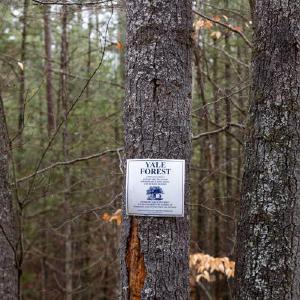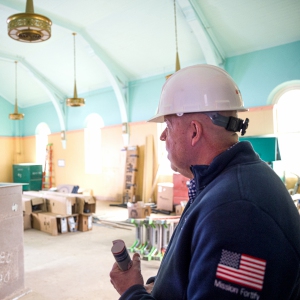Bow joins other towns in expanding conservation opportunities with new financial support option
|
Published: 03-13-2025 2:53 PM
Modified: 03-14-2025 8:47 AM |
Bow landowners looking to conserve their property now have a new option to secure financial support following a vote by residents at Wednesday’s annual town meeting.
The measure allows the Conservation Commission to spend funds on land purchases, including surveys, title searches, fees, and stewardship costs said Sandy Crystall, the chair of the commission. A public hearing will be held before any money is spent.
“The goal is to conserve land at the lowest cost now and into the future,” said Crystall.
Currently, the Conservation Commission has access to $900,000, which comes from a fund created when landowners take their property out of current use and developers pay into it when they develop the land.
This fund is set aside for conservation purposes to balance the development that has taken place.
With the new option in place, the commission can partner with organizations like Bow Open Spaces, a qualified land trust, to help buy property or conservation easements. As a result, landowners have more opportunities to secure funding in exchange for permanently conserving their land.
Chris Nicolopoulos, a select board member, raised concerns as a citizen about the commission being able to spend the funds without a vote from the board or the residents.
“These optional powers will allow them for all and forever to purchase and use all of the money available to them to purchase property in the name other than the Conservation Commission,” said Nicolopoulos. “They do have to be a qualified entity, but there are some 1,700 qualified entities authorized by the IRS, and so I think you just need to consider that before you authorize this.”
Article continues after...
Yesterday's Most Read Articles
 Federal judge finds Bow School District’s actions ‘entirely reasonable’ in transgender athlete protest by parents
Federal judge finds Bow School District’s actions ‘entirely reasonable’ in transgender athlete protest by parents
 What to know about the plan to allow students to attend any public school in the state
What to know about the plan to allow students to attend any public school in the state
 Hometown Hero: How Concord High’s Izzie Boom ignited a fund-raising duck explosion for Rett Syndrome
Hometown Hero: How Concord High’s Izzie Boom ignited a fund-raising duck explosion for Rett Syndrome
 In latest attempt to pass eviction bill, House votes to include in budget
In latest attempt to pass eviction bill, House votes to include in budget
 High school baseball previews: Defending champs Bow focusing on culture, fundamentals
High school baseball previews: Defending champs Bow focusing on culture, fundamentals
Crystall reassured the public, saying that the commission has set up an administrative policy that ensures the select board must approve any expenditures beyond a certain amount.
More than 40 other towns, including Hopkinton, Webster, and Bradford, have already adopted the change, which is allowed under state law through “optional powers” given to conservation commissions.
The law that allows for this change, passed by the New Hampshire legislature in 2008, enables towns to contribute conservation funds to projects led by private conservation groups, like land trusts, without needing to own the land themselves.
This provides an option for longtime residents who wish to donate land for conservation while preserving their family’s legacy in the process.
If the town were to own the land, there’s no guarantee the property owner’s name would remain associated with it permanently.
Jack Crisp said that the initiative is beneficial for the town by helping conserve open spaces. He also said that the select board-appointed Conservation Commission members have demonstrated financial responsibility over the years.
“You need to act when that opportunity arises. You cannot wait for a town meeting or something else to get approval the people,” said Crisp. “I think if you look at this history, it proves that they have done a great job. They’re trying to protect our water; they’re trying to protect our open Spaces; they’re trying to protect our wildlife and they’re trying to add to our property values.”
Voters also approved an $11.8 million operating budget, a 3.2% increase from last year.
Although the town’s tax rate is set to decrease by 3.7%, residents may not see a reduction in their tax bills due to a recent property revaluation that significantly increased home assessments.
Nearly an hour of the meeting was focused on a proposal discussing limiting the town manager’s control over spending money from a fund associated with the Parks and Recreation Department.
Matt Poulin, one of the petitioners behind the proposed change, raised concerns about the lack of oversight on the profits generated by the town’s before- and after-school programs and the Celebrating Children preschool at the Bow Youth Center, which feed into the revolving fund.
These programs rely on user fees, not taxpayer dollars, to fund their operations
Currently, the town manager controls how that money is spent.
“The taxpayers need to have input on how these monies are spent,” Poulin said, explaining the intent behind the proposal. “What this is trying to do is give all of you the authority to spend this money.”
Ben Kiniry, the lead petitioner, was not at the meeting.
Poulin also moved to transfer an additional $100,000 from the fund to the community building fund.
But residents voted against it.
Poulin eventually asked residents to vote against his petitioned warrant article, saying the language wasn’t clear and that a better version could be brought forward next session.
Sruthi Gopalakrishnan can be reached at sgopalakrishnan@cmonitor.com









 Swanzey forest stewards battle red pine killer
Swanzey forest stewards battle red pine killer Driver acquitted in bikers’ deaths in New Hampshire pleads guilty to impaired driving in Connecticut
Driver acquitted in bikers’ deaths in New Hampshire pleads guilty to impaired driving in Connecticut Granite Geek: It takes a village to keep nasty bugs away
Granite Geek: It takes a village to keep nasty bugs away New Hampshire set to ‘welcome home’ veterans with new 15-acre campus in Franklin
New Hampshire set to ‘welcome home’ veterans with new 15-acre campus in Franklin
